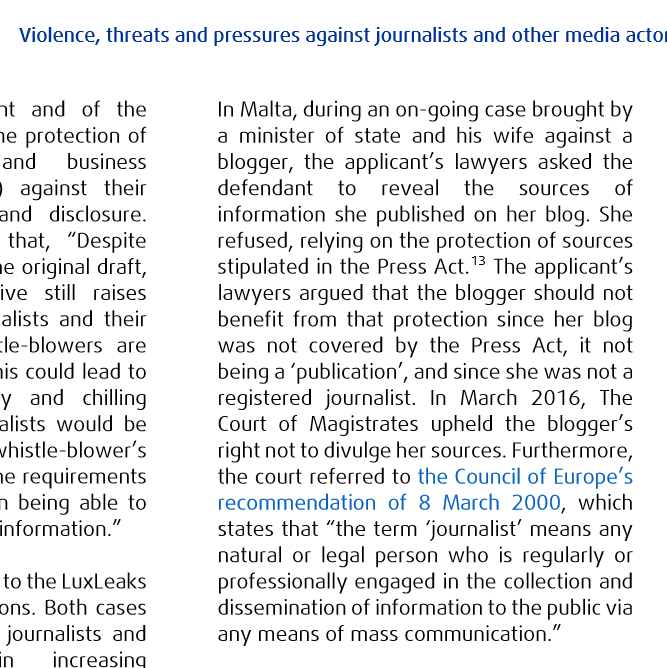Konrad Mizzi’s attempt at forcing me to disclose my source makes it to European Union Agency for Fundamental Rights report
The excerpt in a screenshot below is from the European Union Agency for Fundamental Rights report, Violence, Threats and Pressures Against Journalists and Other Media Actors in the EU, which was its contribution to the second Annual Colloquium on Fundamental Rights, last month.
It refers to the case in which Konrad Mizzi, who was then the Minister for Health and Energy, and the Labour Party lawyer, Pawlu Lia, argued before the court that I am not a journalist because I do not have a press card issued by the government of Malta, and that this website is not a newspaper, television station or radio station, and therefore I am not covered by the laws which safeguard journalists in the protection of their sources. The court responded that of course I am a journalist, that this website is to be defined as a newspaper under the law, and that no, I can’t be made to disclose my sources.
The European Union Agency for Fundamental Rights report says in its introduction:
“A free and pluralist media is vital to the democratic functioning of the European Union and its member states. This means that journalists, publishers, editors, bloggers and other media actors must be able to carry out their tasks without fear of intervention or reprisals – which requires adequate protection from violence, threats and pressures.
“Like everyone else, journalists and other media actors can be intimidated by threats and pressures. This can affect how they work, which stories they decide to report and how they report on them. Furthermore, an attack on one journalist or media worker can have a chilling effect on others, particularly when perpetrators can act with impunity, as the Council of Europe, UNESCO and the Organization for Security and Co-operation in Europe (OSCE) have repeatedly noted.
(…)
“Physical attacks against journalists and other media actors in the EU remain rare and usually take place in the context of public assemblies. However, online harassment and threats are widespread, particularly on social media. Such practices, including ‘trolling’, often target journalists and bloggers, while those with minority backgrounds are also at the receiving end of racist, xenophobic or other forms of abuse.
“Women journalists and bloggers, for their part, are often targeted specifically because of their gender, and face threats of rape and violence, as well as intimidation and harassment.”

